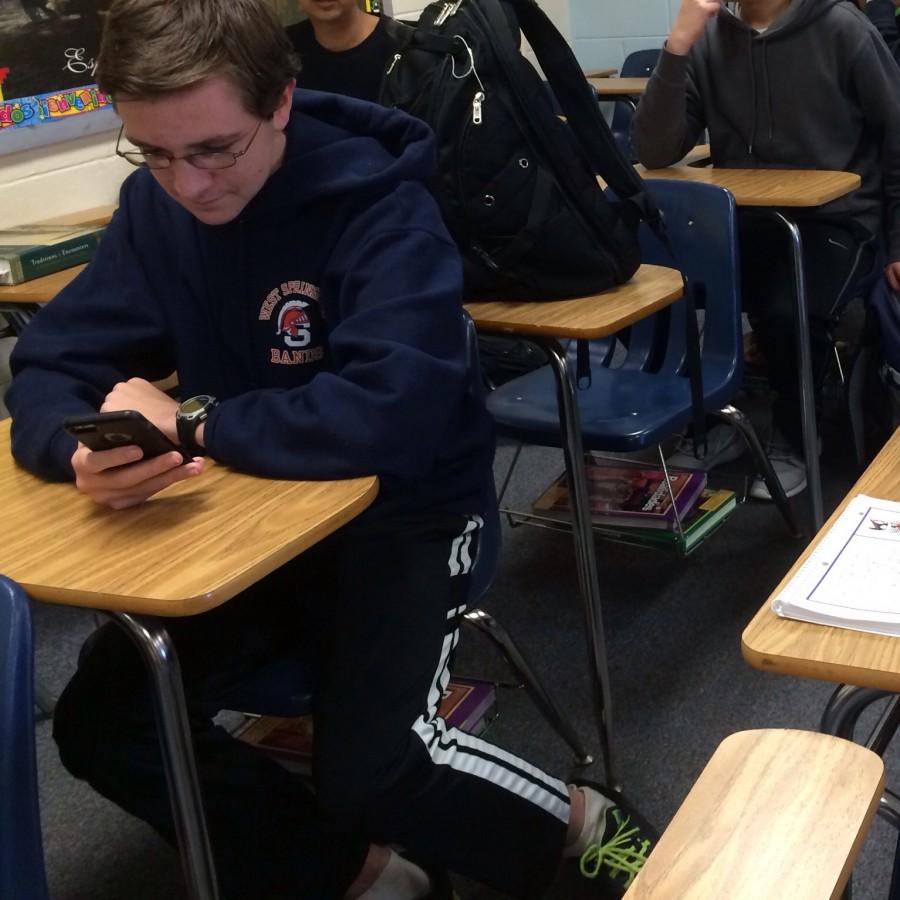Social media has its critics
“It’s really hard to avoid the lure of bright shiny things. A book needs more work. It needs to be digested.” —Madeleine Deliee, 10th-grade English teacher
Photo courtesy of Lara Mercado
Sophomore Peter McAuliffe uses his phone during the day while sophomore Greyson MacKinnon uses the time to read. Teachers are trying to reduce the usage of phones because of its distraction.
December 11, 2015
With the ever consuming temptations of social media, it is easy to get lost in the void of Instagram posts, subtle Facebook profile stalking, or devotedly checking tweets from celebrity crushes.
Unfortunately, all of the happy times spent surfing the net can bring some consequences. Reading short and quick worded online posts, often times lacking proper spelling and grammar, tends to lower the need for deeper analysis of what is being read. Although there has been no professional research done on the direct link between social media and reading skills, a substantial amount of criticism on this growing obsession over social sites has been the cause of the blame towards falling reading comprehension.
“There have always been students who don’t read,” said English teacher Madeleine Deliee. “It’s really hard to avoid the lure of bright shiny things. A book needs more work. It needs to be digested.”
In her class, Deliee has discovered that students cannot resist the urge to use their phones every moment she pauses in her lecturing. Student attention is mostly directed towards cell phones rather than literature. The number one rival of books is none other than the Internet.
“I don’t think I’ve seen a drop in reading ability, but more of a drop in desire,” said English and Creative Writing teacher Laura Goodman. “The downside of phones is that kids aren’t reading anymore. But I guess that’s also a generalization.”
Though social media is always viewed as a negative influence on teenagers, there are some upsides that are educationally beneficial. Goodman has seen a greater number of students in her Creative Writing class this year.
“They’re writing more than other generations,” said Goodman. “They are always telling stories and their ideas.”
One benefit of social media allows teens to have access to creative ideas on a larger scale with online art, including easier communication even from far distances. With the rise of online books, students who prefer staying on the net can get a chance to turn to a different source other than printed books.
The availability of the Internet also allows one to look up information without using encyclopedias or reference books.
“If people don’t understand something in a book like symbolism, they can use the internet to help them.” said sophomore Ashley Koehle.
Uploading pictures of what was for dinner last night or updating relationship statuses are not the only uses of social media. Through an educational aspect, students have utilized their cell phones to ask each other questions regarding the lesson the other day or sharing notes taken in class.
If not through texts and calls, planning for group projects can be taken over to live hangouts such as Skype.
“Students can use social media to promote group study,” said Deliee. “They’re reasonably savvy about gathering information quickly.”
Although the lack of words in modern technology may contribute to falling reading skills and deeper analysis of English, teens have found other ways to compensate for time lost scrolling through an endless feed of pictures and short captions.
“Social media allows you to be linked with different people across the globe,” said junior Eisha Sharma. “On that small platform, it also allows us to be more aware of current events and what’s going on around us.”





